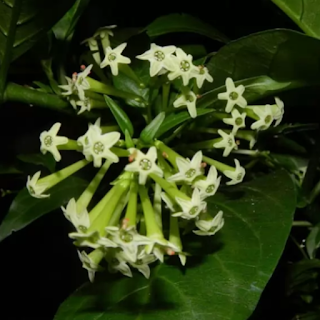MOON REFLECTORS
There's something that shines as bright as the stars in the night, and is as fragrant as the strongest of incenses on earth. Literally, it’s cogently intoxicating and unignorable. At least in my case, I've always loved and can't simply keep myself from appreciating the finest work of the divine to have created a finesse.
Well, about the chronology, it'll starts with the nostrils, the smell receptors are stimulated when inhaled. Signals travel from the olfactory nerve to the olfactory bulb. Signals then, from the olfactory bulb are sent to other parts of the brain and interpreted. Know what, enchanting fragrance eliciting my soul. Honestly, since the very first encounters I haven't ever been able to avoid even the slightest of these fragrances. And this particular smell, that had almost shook my olfactory system as tempestuously as it could was just another floral fragrances. You may say!! But for me, it was divine and invigorating rush inside. And the next thing I found myself doing was to track the source of this dissemination, even though it was dark. And what I found was a prodigious Devil tree, with big bunches of greenish-white flowers like stardust reflecting the moon and wafting my soul with every gush of breeze.
Well, no wonder that was not only once but many instances, sometimes from yellow night-blooming jessamine or sometimes from the parijhat shrub and sometimes from the devil beauties. And very unlikely, but from the neem tree as well.
The Nocturnal or the night-blooming flowers is just another nature's adaptability which you can't have enough of and would probably end up binging on. The intoxicating beauty and fragrance of these flowers will pore and whet you and elicit freshness in you.
These flowers are quite often called as Raatrani in India. These are extraordinarily scented as compared to their diurnal counterparts, purposely to attract the nocturnal pollinators. Also they're usually bright white or light shaded colours to be visible to the expected pollinators. Many of these flowers recede their brightness with the onset of day and often shed in the daytime, not all, though. Even the fragrance of these night beauties becomes indistinct during the daytime. A few of them including parijhat have medicinal properties too.
Following is the list of most popular and easily found night-bloomers just in case you might've been planning on a Moon Garden while going through.
• Devil tree (Alstonia Scholaris); named so just because of it's devilish look.
• Chocolate Daisy (Berlandiera Lyrata)
• Queen of the night
• Datura (Angel’s trumpet)
• Evening Primrose
• Four O’clocks (Mirabilis Jalapa)
• Easter Lily cactus
• Rain lilies (Zephyranthes Drummondii)
• Tuberose
• Gardenia Augusta
• Japanese Wisteria (Wisteria Floribunda)
• Parijhat- also called as the "tree of sorrow" or the "teardrop of princess Parijhatika" from an ancient story of contrite love and separation.
VEDIKA
GLOSSARY
1. Cogently: having power to compel or constrain
2. Finesse: refinement of workmanship.
3. Tempestuously: resemblance of a storm.
4. Dissemination: an act of dispersing or diffusing something.
5. Prodigious: of momentous/ominous significance
6. Wafting: to be driven or carried along in air
7. Pore: direct one's attention on something
8. Whet: make keen or more acute
9. Elicit: call forth (emotions, feelings and responses)
10. Diurnal: something or someone active during the day.
11. Nocturnal: something or someone active during the night.
12. Recede: to retreat or become distant.





The selection of words is always so good, Everytime I learn new words ✨💯
ReplyDeleteMajor✨ more power to your pen
ReplyDeleteGreat job 👏👏💐
ReplyDeleteThe quintessential quality of a writer is his /her ability to notice and experience the subtle stimuli of pleasure and joy that the nature has to offer and then weave it in words in a manner that the readers feels it even though they haven't had a direct association with that stimulus. You definitely got the knack for it.Way to go girl.
ReplyDeleteVery nice Vedika...👍👍👌
ReplyDeleteIncredible
ReplyDelete